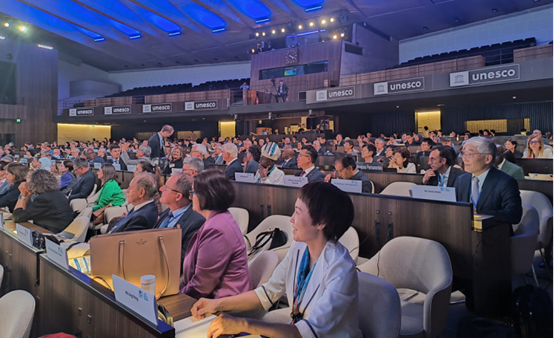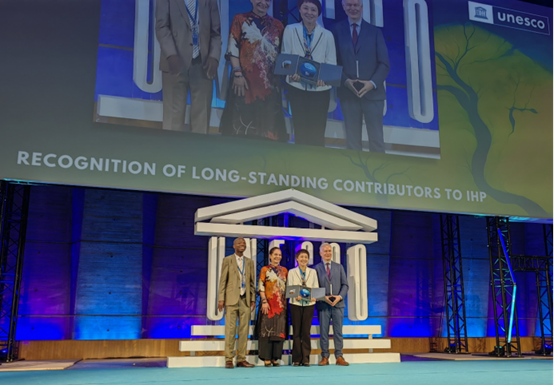On 11 June, the High-Level Celebration of
the 50th Anniversary of the Intergovernmental Hydrological Programme (IHP)
and 60 years of UNESCO Water Sciences opened in Paris, France. Representatives
from key UN agencies, over ten ministerial-level delegations, international
organization leaders, UNESCO Water Family members, and leading global water
scientists were in attendance.

The opening segment featured speeches by
UNESCO Director-General Ms. Audrey Azoulay and Tajikistan’s Foreign Minister
Mr. Sirojiddin Muhriddin, emphasizing UNESCO IHP’s pivotal role in tackling
water-related global issues and reaffirming its significance as the UN’s
premier intergovernmental water science initiative. A ministerial segment
titled “Water Science: for Life, Prosperity, and Peace” further showcased
member states’ water strategies and IHP’s contributions.
During the partners’ statements, UN
Secretary-General’s Special Envoy on Water Retno Marsudi, WMO Deputy
Secretary?General Ko Barrett, UN DESA Deputy Secretary?General, IAEA
Director?General Rafael Mariano Grossi, and UN-Water Chair and President of the
International Fund of Agricultural Development (IFAD) álvaro Lario, among
others, shared perspectives on current water challenges and future
collaboration.
The International Research and Training
Centre on Erosion and Sedimentation (IRTCES), which is hosted by IWHR, received
a UNESCO IHP Long-Term Service Award during the high-level celebration, marking
its distinction as UNESCO’s first Category 2 Centre.
Water science and management are key
pillars of UNESCO's mandate for sustainable development, covering vital aspects
of human wellbeing and environmental protection. UNESCO's broad approach spans
areas such as groundwater assessment and drought monitoring, supporting
improved water resource management at local and transboundary levels. UNESCO
Intergovernmental Hydrological Programme (IHP) is the main vehicle for
addressing today's water challenges, drawing on a wide network of experts and
specialized centres.
As the United Nations' sole
intergovernmental programme dedicated to water research and management, IHP
facilitates international cooperation on water-related challenges. Following
its establishment in 1975, subsequent to the International Hydrological Decade,
the programme has undergone significant evolution, transitioning from a focused
hydrological science initiative to a comprehensive, integrated, and
transdisciplinary water sciences programme. The programme's operational
framework encompasses 29 water-related Centres, 93 UNESCO water-related Chairs,
and 170 National Committees and 17 Flagship Initiatives, facilitating effective
knowledge transfer between scientific research and practical implementation.
Audrey Azoulay, Director General of
UNESCO, and others attended the high-level event and delivered opening remarks.
Leaders from relevant UN agencies, more than 10 national ministries, presidents
of international organizations, members of the UNESCO water family, and members
of the global water science community attended the meeting. Mr. LIU Zhiyu,
Director General of the Department of Hydrology of the Ministry of Water
Resources, Prof. PENG Jing, Director of the International Research and Training
Center on Erosion and Sedimentation (IRTCES), President of the China Institute
of Water Resources and Hydropower Research (IWHR) attended the meeting.
In the opening session, Ms. Audrey
Azoulay, Director General of UNESCO, and Mr. Sirojiddin Muhriddin, Minister of
Foreign Affairs of Tajikistan, delivered opening remarks, emphasizing the
common water challenges facing the globe, stressing the important role of
UNESCO IHP as a platform for solving water issues and advancing the
water-related goals of the United Nations Sustainable Development Agenda, and
discussing future water development strategies and cooperation. The Ministerial
Roundtable was held on the theme of Water.
The theme of the Ministerial Round Table
was 'Water Science: For Life, Prosperity and Peace'. Ministerial guests and
delegates made presentations on the important role of UNESCO IHP in the field
of water and the relevant water strategies in their countries.

The conference presented the UNESCO IHP Long Term Outstanding
Contribution Award, and the International Research and Training Center on
Erosion and Sedimentation, as the first UNESCO category 2 center in the world,
received the award.
The International Sediment Initiative (ISI) undertaken by the IRTCES
and various others research outcomes produced by the center were included in
the IHP’s 50-year special publication “Water is Life”, which was unveiled
during the event.
The IHP serves as the UN’s primary instrument for addressing today’s
pressing water challenges. The year 2025 marks both the 50th anniversary of IHP
and 60-year commitment to water sciences. As the only intergovernmental
programme in the UN system dedicated specifically to water research and
management, IHP has played a vital role in fostering international
collaboration to address global water challenges.
Since its establishment, IHP has evolved significantly from its
early focus on hydrological science to a comprehensive, integrated, and interdisciplinary
water science program. Its operational framework now includes a robust network
of 29 UNESCO Category 2 Water Centers, 93 Water-related UNESCO Chairs, 170
National Committees, and 17 flagship initiatives, promoting knowledge sharing,
capacity development, and the translation of scientific research into effective
water policies and practices.

